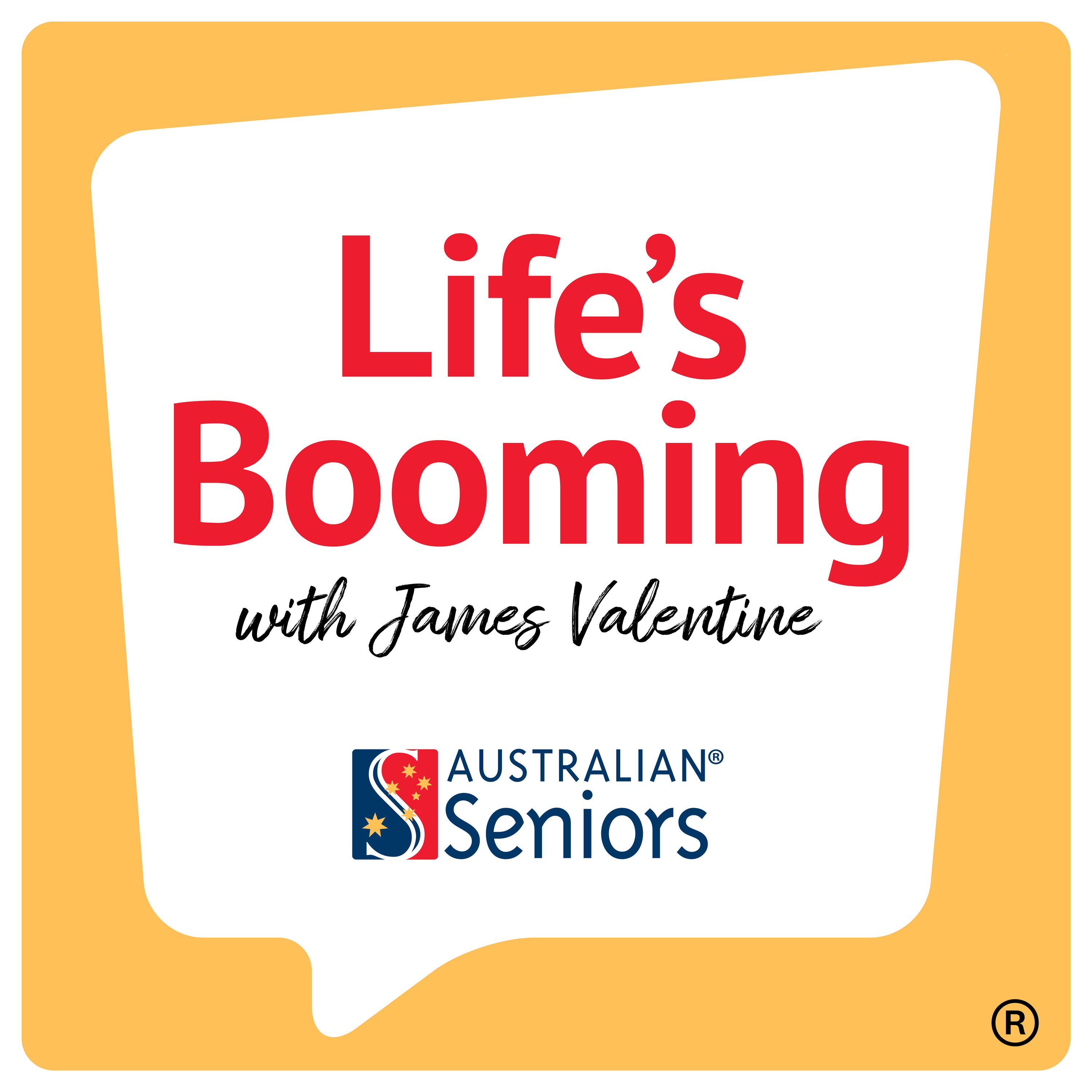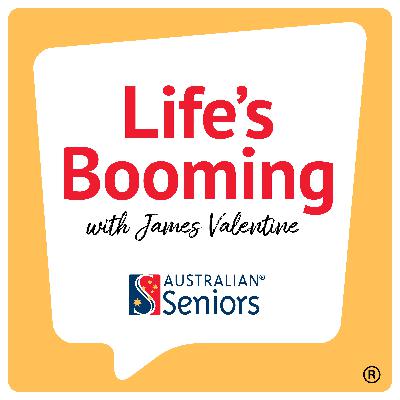Dying well We’re all going to die, but how we acknowledge death and dying is a very personal experience. Award-winning journalist and author Tracey Spicer and anthropologist Dr Hannah Gould explore etiquette, rites and traditions to find out what makes a ‘good death’. About the episode – brought to you by Australian Seniors. Join James Valentine for the sixth season of Life’s Booming: Dying to Know, our most unflinching yet. We’ll have the conversations that are hardest to have, ask the questions that are easy to ignore, and hear stories that will make you think differently about the one thing we’re all guaranteed to experience: Death. Featuring interviews with famous faces as well as experts in the space, we uncover what they know about what we can expect. There are hard truths, surprising discoveries, tears and even laughs. Nothing about death is off the table. Tracey Spicer AM is a Walkley award-winning journalist, author and broadcaster. And she's an ambassador for Dying With Dignity. A vocal campaigner and advocate for voluntary assisted dying (VAD), Tracey penned a letter to her mother following her painful death in 1999. Dr Hannah Gould is an anthropologist who works in the areas of death, religion and material culture. She recently appeared on SBS documentary: Ray Martin: The Last Goodbye. Hannah’s research spans new traditions and technologies of Buddhist death rites, the lifecycle of religious materials, and modern lifestyle movements. If you have any thoughts or questions and want to share your story to Life’s Booming, send us a voice note – lifesbooming@seniors.com.au Watch Life’s Booming on YouTube Listen to Life's Booming on Apple Podcasts Listen to Life's Booming on Spotify For more information visit seniors.com.au/podcast Produced by Medium Rare Content Agency, in conjunction with Ampel Disclaimer: Please be advised that this episode contains discussions about death, which may be triggering or upsetting for some listeners. Listener discretion is advised. If you are struggling with the loss of a loved one, please know that you are not alone and there are resources available. For additional support please contact Lifeline on 131 114 or Beyond Blue on 1300 224 636. TRANSCRIPT: James: We're all going to die. Happens to all of us. But how we acknowledge death and dying is of course a very personal experience. With our guest and our expert, we're going to explore the etiquette, the rites and traditions seen in Australia and around the world. Someone who knows a lot about the rites and traditions of death is Dr Hannah Gould, an anthropologist who works in the areas of death, religion and material culture. We're also going to be joined by Tracey Spicer, she’s a Walkley award-winning author, journalist and broadcaster. And she's an ambassador for Dying With Dignity. Tracey and Hannah, welcome. Thank you so much. Tracey: Hello. James: Thank you for coming. Hannah Gould. Hello. Thank you for coming. Hannah: Thank you. James: Fantastic. Let's talk death! Tracey: Why not? There'll be lots of fun. James: Do you laugh in the face of death? Hannah: What else can you do? I mean, look, you know. Lots of sadness, lots of joy, every single emotion is reasonable, surely. I mean, it's like the question, the ultimate question of philosophy, of history, of every discipline. Every response is valid. Not always useful, or helpful. James: Yeah. Yeah. Hannah: But valid. Tracey: Well, it's a universal topic of conversation and that's why I've always loved dark humour. Because you do have to laugh, otherwise what do you do? James: I also think it's, it is the ultimate joke that we are all going to die, but we live like we're not going to. We live every day as though it's just not going to happen at all. Tracey: Especially in Western society, I think other cultures have got it right and we're in such deep denial about it. It's detrimental to all of us. James: Yeah. Now this is your area of expertise really, is that do other cultures have it right? Hannah: Everyone does it differently. Right or wrong is kind of a difficult thing to judge. I think certainly there's a big thing called, like, the denial of death thesis, right. And, and people like Ernest Becker, a lot of different philosophers and anthropologists and cultural, you know, analysis have looked at Western culture and gone, Oh my gosh, we are so invested in denying death, right. And whether that's through denying death by religions that say you're going to live forever, like, you know, don't worry, it's not the end. You'll pop off to heaven or whatever it is. Or through, you know, great heroic myths. Yes, you'll die, but the nation will remember you forever. So, you know, you won't really die. You'll be a martyr. Or contemporary, you know. Yes, you'll die, but have you seen how great the shopping is? You know, we can just ignore, we can deny death by being on Instagram and, you know, consuming, right, so, I think Western culture in particular, the way we've organised our society, allows us to not think about death. James: And we've organised death to be somewhere else, usually now. To be in a hospital, to be in palliative care somewhere. And they may be good, but they're not, they're not in the cottage, are they? They're not next to, not in the bedroom. Hannah: Not in the bedroom. So, we know that, say, 70% of Australians wish to die at home. Only about 15% do. And that is a rate that is lower than all these other countries we like to compare ourselves. So Australians are more institutionalised in their death than places like Ireland, like New Zealand, the United States of America, even Canada. We tend, more than other countries, to die in institutions – aged care, hospitals, and hospices. James: Yeah, right, right. The other way in which we deny death is, or the other way in which other cultures have a different attitude to death, will be that it'll either be more accepting – we are all going to die, will be part of their every day – or they may have a notion of reincarnation and coming back, which means that that's a very different attitude to death, really, than a, than a heaven and a hell. Hannah: Yeah, it's not necessarily an end so much. I think that's kind of quite common in, say, you know, Buddhist or Hindu or other kind of dharmic religions, particularly Asian religions. And then, obviously, there's a lot of Asian religion that's part of Australian society, so that's also quite present in Australia. But we can also have a kind of more secular idea about that. You know, a lot of these, a lot of my mum's generation in particular, have kind of a green environmental kind of reincarnation model where she will say, well, I don't particularly believe in heaven, but I do believe I'm going to become compost. Food for worms, you know, I'll come back as a tree or a flower or a tomato plant, you know, and that's, that's a kind of reincarnation of like reintegration into the natural environment, as it were. So there are some kind of myths or stories we can tell ourselves that perhaps help us think about death more positively. James: I've got a, a friend of mine who'd be into her 80s has said, oh, funeral? Just put me up the top paddock, let the crows have a go. Tracey: Yeah. My dad wants to be buried in a cardboard box, and I think that's a wonderful idea. James: We all say that, don't we? That's a really common one as well. I hear that a lot on the radio. People will go, mate, just, I don't care, put me out with the, on the hard rubbish day. Hannah: In the paddock, whatever it is… James: …the paddock, that’s the same sort of thing I said. You know, like, do we really want that, do you think? Hannah: Oh, do we really want that? I do think Aussies are pretty pragmatic about death. I do think we have a certain streak in us that's kind of like, you know what, it's all a bit much fuss, it's all too much. You kind of even get these people who therefore say, don't have a funeral. You know, I really don't want to have a funeral. Please don't even, you know, no fuss. That can be kind of sad sometimes because I think it's some people kind of not acknowledging how many people love them and miss them. James: Yeah. Hannah: Um, but maybe it's also a bit of an Aussie humour, dry humour, that, that black humour again of kind of, you know, trying to laugh in the face of death. Why not? Tracey: I would agree, but then we all get sucked in when we're in the funeral home, and they show you the cardboard box, and then they show you the glossy one that's 10 or 20 thousand dollars, and you think, did I really love that person that much, or should I do it? So it all feeds into what you were talking about before, that consumerism and overcommercialisation. James: Well, I also think sometimes, I would think it's about weddings. Weddings and funerals, well, who's it actually for? Tracey: Yeah, yeah. Well it's a punctuation mark, isn't it? I'm a lifelong atheist, but Tracey: I do enjoy, it sounds terrible, going to those kind of ceremonies, whether it's a funeral or a wedding, because it's important to celebrate or commemorate these changes, these huge changes. James: I love the sharing of stories at a funeral. People start talking. Tracey: Well, you learn so much about someone's life that you may not have known. And also often they're rich for that dark humour. I'll never forget my grandmother's funeral, who I was incredibly close to. And my father's new girlfriend loved my grandmother. She was so distraught she tried to throw herself into the hole in the ground on top when she was throwing the dirt in and I thought, well, that's intense. James: That's good. Tracey: That's, I've never seen that before. That's a first. Hannah: Oh, I've seen that before. Tracey: Have you?! Hannah: I will say that, you know, when you attend enough funerals or attend enough cremations for professional reasons, um, as it were, you kind of see everything, every range of human







